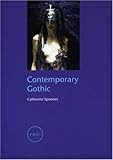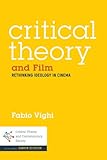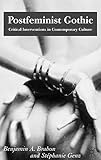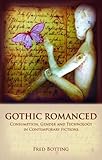Dario Argento – Contemporary Film Directors

Commanding a cult following among horror fans, Italian film director Dario Argento is best known for his work in two closely related genres, the crime thriller and supernatural horror. In his four decades of filmmaking, Argento has displayed a commitment to innovation, from his directorial debut with 1970’s suspense thriller The Bird with the Crystal Plumage to 2009’s Giallo. His films, like the lurid yellow-covered murder-mystery novels they are inspired by, follow the suspense tradition of hard-boiled American detective fiction while incorporating baroque scenes of violence and excess. L. Andrew Cooper uses controversies and theories about the films’ reflections on sadism, gender, sexuality, psychoanalysis, aestheticism, and genre to declare the anti-rational logic of Argento’s oeuvre. Approaching the films as rhetorical statements made through extremes of sound and vision, Cooper places Argento in a tradition of aestheticized horror that includes De Sade, De Quincey, Poe, and Hitchcock.He reveals how the director’s stylistic excesses, often condemned for glorifying misogyny and other forms of violence, offer productive resistance to the cinema’s visual, narrative, and political norms. L. Andrew Cooper is an assistant professor of film and digital media at the University of Louisville and the author of Gothic Realities: The Impact of Horror Fiction on Modern Culture. A volume in the series Contemporary Film Directors, edited byJames Naremore
Price : £ 14.99
Dario Argento – Contemporary Film Directors

Commanding a cult following among horror fans, Italian film director Dario Argento is best known for his work in two closely related genres, the crime thriller and supernatural horror. In his four decades of filmmaking, Argento has displayed a commitment to innovation, from his directorial debut with 1970’s suspense thriller The Bird with the Crystal Plumage to 2009’s Giallo. His films, like the lurid yellow-covered murder-mystery novels they are inspired by, follow the suspense tradition of hard-boiled American detective fiction while incorporating baroque scenes of violence and excess. L. Andrew Cooper uses controversies and theories about the films’ reflections on sadism, gender, sexuality, psychoanalysis, aestheticism, and genre to declare the anti-rational logic of Argento’s oeuvre. Approaching the films as rhetorical statements made through extremes of sound and vision, Cooper places Argento in a tradition of aestheticized horror that includes De Sade, De Quincey, Poe, and Hitchcock.He reveals how the director’s stylistic excesses, often condemned for glorifying misogyny and other forms of violence, offer productive resistance to the cinema’s visual, narrative, and political norms. L. Andrew Cooper is an assistant professor of film and digital media at the University of Louisville and the author of Gothic Realities: The Impact of Horror Fiction on Modern Culture. A volume in the series Contemporary Film Directors, edited byJames Naremore
Price : £ 14.99
Dario Argento – Contemporary Film Directors

Commanding a cult following among horror fans, Italian film director Dario Argento is best known for his work in two closely related genres, the crime thriller and supernatural horror. In his four decades of filmmaking, Argento has displayed a commitment to innovation, from his directorial debut with 1970’s suspense thriller The Bird with the Crystal Plumage to 2009’s Giallo. His films, like the lurid yellow-covered murder-mystery novels they are inspired by, follow the suspense tradition of hard-boiled American detective fiction while incorporating baroque scenes of violence and excess. L. Andrew Cooper uses controversies and theories about the films’ reflections on sadism, gender, sexuality, psychoanalysis, aestheticism, and genre to declare the anti-rational logic of Argento’s oeuvre. Approaching the films as rhetorical statements made through extremes of sound and vision, Cooper places Argento in a tradition of aestheticized horror that includes De Sade, De Quincey, Poe, and Hitchcock.He reveals how the director’s stylistic excesses, often condemned for glorifying misogyny and other forms of violence, offer productive resistance to the cinema’s visual, narrative, and political norms. L. Andrew Cooper is an assistant professor of film and digital media at the University of Louisville and the author of Gothic Realities: The Impact of Horror Fiction on Modern Culture. A volume in the series Contemporary Film Directors, edited byJames Naremore
Price : £ 14.99
Dario Argento – Contemporary Film Directors

Commanding a cult following among horror fans, Italian film director Dario Argento is best known for his work in two closely related genres, the crime thriller and supernatural horror. In his four decades of filmmaking, Argento has displayed a commitment to innovation, from his directorial debut with 1970’s suspense thriller The Bird with the Crystal Plumage to 2009’s Giallo. His films, like the lurid yellow-covered murder-mystery novels they are inspired by, follow the suspense tradition of hard-boiled American detective fiction while incorporating baroque scenes of violence and excess. L. Andrew Cooper uses controversies and theories about the films’ reflections on sadism, gender, sexuality, psychoanalysis, aestheticism, and genre to declare the anti-rational logic of Argento’s oeuvre. Approaching the films as rhetorical statements made through extremes of sound and vision, Cooper places Argento in a tradition of aestheticized horror that includes De Sade, De Quincey, Poe, and Hitchcock.He reveals how the director’s stylistic excesses, often condemned for glorifying misogyny and other forms of violence, offer productive resistance to the cinema’s visual, narrative, and political norms. L. Andrew Cooper is an assistant professor of film and digital media at the University of Louisville and the author of Gothic Realities: The Impact of Horror Fiction on Modern Culture. A volume in the series Contemporary Film Directors, edited byJames Naremore
Price : £ 14.99
Critical Theory and Film: Rethinking Ideology Through Film Noir (Critical Theory and Contemporary Society)
Postfeminist Gothic: Critical Interventions in Contemporary Culture
Gothic Romanced: Consumption, Gender and Technology in Contemporary Fictions
Contemporary Gothic (FOCI)

Gothic images pervade contemporary culture, from popular interior decorating programmes to news stories of vampire-obsessed killers. This book seeks to analyse this trend. Why is Gothic perennially undergoing revival? What is its role in modern consumer culture? And is its popularity or its usefulness drawing to an end?
- New
- Mint Condition
- Dispatch same day for order received before 12 noon
- Guaranteed packaging
- No quibbles returns
<- Read More Buy Now for [wpramaprice asin=”1861893019″] (Best Price)
Gothic Art Now: The Very Best in Contemporary Gothic Art and Illustration

- New
- Mint Condition
- Dispatch same day for order received before 12 noon
- Guaranteed packaging
- No quibbles returns
<- Read More Buy Now for [wpramaprice asin=”1905814356″] (Best Price)



